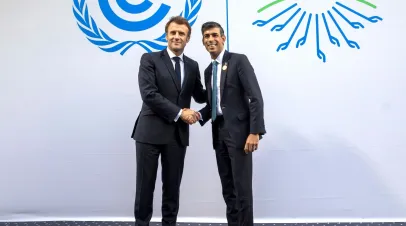The Franco-British Summit: back in business
This article was originally published on July 11, 2025 in UK in a Changing Europe.
The 35th Franco-British summit in 2023 was mostly about displaying unity after years of mistrust. Yesterday’s meeting was different: it was about delivery. And, by and large, it delivered – especially on defence, energy, industrial cooperation and the promise of a new pilot scheme to tackle irregular migration in the Channel.
Just five years ago, such announcements would have been unthinkable. Relations were going from bad to worse, strained by Brexit, AUKUS, rows over fishing quotas, small boats and Covid-19 vaccines. Three developments helped thaw the ice: the war in Ukraine, Donald Trump’s return to the White House, and Labour’s pledge to reset relations with the EU. Trust isn’t fully repaired, but it’s now firm enough to produce results.
Cooperation is usually driven by necessity and trust. Today, Europe is facing multiple concomitant threats: a security crisis triggered by Russia’s war on Ukraine and Trump’s questioning of long-term US guarantees to Europe; an economic competitiveness challenge, especially in the face of US tariff wars and Chinese overcapacity; and intensifying political polarisation at home.
France and the UK have a lot more in common that they care to admit. They have two of the largest and most capable armies in Europe and share a similar strategic culture. They are the only European countries to have a nuclear deterrent and a permanent seat on the UN Security Council. Their defence partnership is long-standing – first formalised under the 2010 Lancaster House Treaties and now refreshed. Their economies are similarly sized, and in 2024 bilateral trade reached £100 billion. Both invest heavily in each other’s markets.
They also share vulnerabilities. Growth is sluggish, debt is mounting, and both governments face resistance to budgetary reform. Irregular migration is a mutual concern – though in France, the focus is more on routes through Italy and Spain than on Channel crossings. Close cooperation is not only wise, but also necessary.
Some summit announcements exceeded expectations. France and the UK have agreed a new Industrial Strategy Partnership to accelerate industrial cooperation in technology, AI and clean energy. EDF, France’s energy company, will invest £1.1 billion in the Sizewell C nuclear plant, and both sides agreed to accelerate interconnector development. Politically, this is quite significant, considering how energy cooperation had previously been used as leverage in Brexit disputes.
On defence, the Lancaster House treaties were updated to include joint planning in cyber and space operations and an uptick in joint defence industrial projects. This refresh is designed with the explicit aim of supporting the European pillar of NATO and complementing the UK-EU security and defence partnership.
The new pilot on irregular migration proposes a ‘one-for-one’ scheme: for every person returned to France after crossing the Channel, one migrant who has had their asylum application processed and approved in France would be relocated to the UK. The proposal still needs EU member state approval and has its critics. Some say it’s too limited – rumours talk of up to 50 returns per week – others argue it does nothing to address the root causes drawing migrants to the UK.
Getting the two governments to agree on key deliverables was not easy, and neither got everything they wanted. The French had hoped for a broader mobility deal that would facilitate school trips to the UK, secure more work visas for French teachers and which would give French students in the UK the chance to work in the UK for one or two years after their studies. Similarly, the British had been hoping for stronger language on joint industrial planning.
Perhaps the most important aspect of this summit was its European dimension. While France and the UK have quietly cooperated on nuclear issues for decades, this is the first time in 30 years that they have updated their language on nuclear cooperation, and the first time that they have made the European dimension of British and French nuclear deterrence so explicit. The statement was clear: “there is no extreme threat to Europe would fail to prompt a joint response.”
This message will reassure allies. Europe has long depended on US extended nuclear deterrence, but with Trump’s calls for greater burden-shifting, doubts are growing. The launch of a Franco-British Nuclear Steering Group to coordinate strategy, capabilities, and operations sends a clear signal – to allies and adversaries alike.
The summit also hosted fresh talks on the Franco-British-led ’coalition of the willing’ – a reassurance presence made up of several thousand European troops that would be stationed in Ukraine in the event of ceasefire. Starmer and Macron held a virtual call with President Zelenskyy and coalition partners – many of whom were in Rome for a Ukraine reconstruction summit hosted by Italian Prime Minister Giorgia Meloni. Staging these discussions during the summit underlined the UK and France’s enduring commitment to Ukraine and to European security.
The Franco-British tandem is up and running again, but for how long?
Macron and Starmer both face challenge at home. Macron’s second term is his last, and polling suggests that the far right would easily reach the final round of the presidential election. Starmer, while newly elected, governs in challenging economic and political conditions.
Still, this summit showed what can be done when pragmatism prevails over posturing. After years of estrangement, the UK and France have found common ground, and Europe is stronger for it. The opportunity is real. The challenge now is to sustain the momentum.

